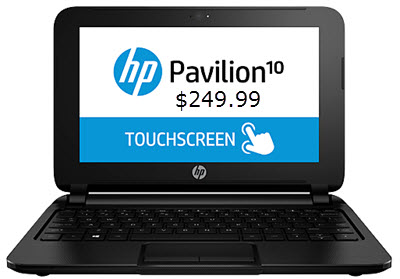 In an obvious effort to combat the growing popularity of Chromebooks, Microsoft is helping hardware manufacturers to build low-priced Windows laptops. Microsoft is using Windows 8.1 With Bing, which was unveiled earlier this year, to spread Windows to more low-cost PCs and tablets. The OS is the same as Windows 8.1 except with Bing as the default search engine in Internet Explorer.
In an obvious effort to combat the growing popularity of Chromebooks, Microsoft is helping hardware manufacturers to build low-priced Windows laptops. Microsoft is using Windows 8.1 With Bing, which was unveiled earlier this year, to spread Windows to more low-cost PCs and tablets. The OS is the same as Windows 8.1 except with Bing as the default search engine in Internet Explorer.
HP, Dell and Lenovo are all early adopters, selling these Windows laptops with basic processors and specifications for under $250.00. The laptops have common features such as 1366-x-768-pixel resolution screens, hard drive storage and HDMI ports.
 HP is shipping the 15z Value Laptop, a 15.6-in. nontouch laptop, and the Pavilion 10z Touch Laptop, which has a 10.1-in. touchscreen. Both are priced at $249.99 and run on low-end AMD processors. Features include Wi-Fi, up to 500GB of hard-drive storage and a maximum of 4GB of memory. The laptops have a comparatively poor(ish) battery life, with the 15z offering 4 hours and 15 minutes, and the Pavilion 10z offering 4 hours.
HP is shipping the 15z Value Laptop, a 15.6-in. nontouch laptop, and the Pavilion 10z Touch Laptop, which has a 10.1-in. touchscreen. Both are priced at $249.99 and run on low-end AMD processors. Features include Wi-Fi, up to 500GB of hard-drive storage and a maximum of 4GB of memory. The laptops have a comparatively poor(ish) battery life, with the 15z offering 4 hours and 15 minutes, and the Pavilion 10z offering 4 hours.
![]() Lenovo’s G40 Entry Level Laptop, which has a 14-in. screen, and the G50-30 Entry Level Laptop, which has a 15.6-in. screen, are priced at $249. The laptops come with 320GB hard drives, 2GB of memory and Intel’s Celeron 2830 processor, which is based on the Bay Trail architecture.
Lenovo’s G40 Entry Level Laptop, which has a 14-in. screen, and the G50-30 Entry Level Laptop, which has a 15.6-in. screen, are priced at $249. The laptops come with 320GB hard drives, 2GB of memory and Intel’s Celeron 2830 processor, which is based on the Bay Trail architecture.
Dell’s $249.99 Inspiron 15 Non-Touch laptop has no USB 3.0 port but is instead equipped with two USB 2.0 ports (PC makers often sacrifice some hardware features in inexpensive laptops). The Inspiron is also equipped with the Celeron 2830 CPU, and includes 500GB of storage and 4GB of DDR3 memory.


I can see them aiming at a niche market of kids in school and retired folk with little PC power demand. But they fail to see the flaw in most systems, systems are complicated. Most “users” are not computer geeks. They just want to use they computers to read/send email, participate in social media, and surf. It is fine if they work or live where they can get free support. I do support for a number of friends and family. A friend has his own shop. We both experience the same thing. Users are confused and rarely use their computer efficiently. Just as in digital cameras, there should be multiple classes of computers. Simple to use (very few options) systems for non-geek users. More advanced systems for the trained and industry. I think the fear is industry would switch to the simpler systems for most of their requirements. Why does a blue collar worker on the line need a complicated powerful computer to enter simple data day after day?